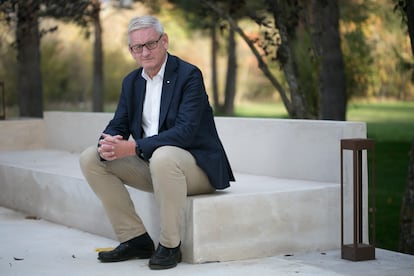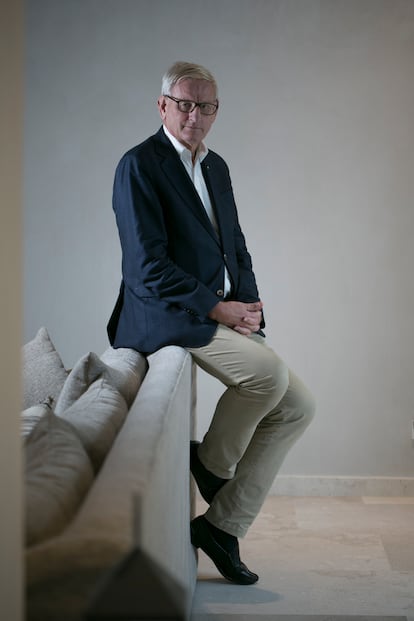Carl Bildt, ex-PM of Sweden: ‘I don’t think we should underestimate the desperation of Putin. A nuclear attack is not something we can exclude’
The veteran politician offered his views on the end of the war, on America and Europe’s role in supporting Ukraine, and on the rise of the far right in his country


Carl Bildt, who was prime minister of Sweden between 1991 and 1994, witnessed the annexation of Crimea by Russia during the last stage of his tenure as foreign minister of his country, a position he held between 2006 and 2014. Since then, Bildt, 73, has spent much of his time traveling around the world, now with a particular focus on the consequences of the conflict in Ukraine. From his extensive diplomatic experience and his many contacts, he draws resounding conclusions about the war in the former Soviet republic. Bildt received EL PAÍS on Wednesday at a country estate in Rascafría, around 60 miles northwest of the Spanish capital Madrid, where he participated in a meeting of the board of the international consulting firm Kreab Worldwide, of which he is vice-president.
The former Swedish leader predicts that the Russian offensive will end when the Vladimir Putin regime falls. Until that happens, however, he warns that “I don’t think we should underestimate the desperation of Putin,” whom he sees as capable of ordering a nuclear attack imminently. The former leader of the Moderate Party of Sweden - which has just returned to power after reaching an agreement with other conservative groups and the far right - defends the toughening of immigration laws in his country and says that Turkey “has not been altogether wrong” when it noted that Stockholm has “not been sufficiently vigilant in fighting terrorism.”
Question. Putin is raising the risk of Ukraine allegedly using a dirty bomb, in what looks like another false flag operation. Do you think there could be any real escalation? It was also feared when four Ukrainian provinces were illegally annexed. Do you think this time it could really happen?
Answer. I think he will. I mean, clearly, the war has not gone particularly well for him. The Russian army has essentially failed and now he is forced to mobilize [civilians]. That probably won’t help too much either. But he will escalate until he collapses, in my opinion. And the worrying thing with what he’s doing now is that he could be in a sort of pretext for him using nuclear weapons. I can’t be certain of that. But there are very worrying signals coming out of him. I think the political atmosphere in Moscow is changing. More and more people are skeptical towards the war. I wouldn’t say that he’s in danger in Moscow at the time, but things are moving in the wrong direction on every front for him at the moment, on the global diplomatic front, on political support inside Russia, in Ukraine, and certainly with the cohesion of the West.
Q. You recently said that the evacuation of Kherson could be either a withdrawal or a sign of an impending nuclear attack. What do you believe now?
A. I don’t know. I wish I knew. But it could be. A lot of people interpreted it could be that the Russians are retreating from Kherson completely. It could also be that it clears the way for them using a nuclear weapon against Ukrainian troops advancing through the area. So we don’t know. I mean, the logic behind what he is doing in Kherson could be interpreted in different ways. But I don’t think we should underestimate the desperation of Putin.
Q. So, do you think a nuclear attack could be imminent?
A. I sincerely hope not. But with the desperation of Putin and with everything moving against him, it’s not something we can exclude.
Q. How will the war end, in your opinion?
A. I think the war will end when Putin disappears from the Kremlin. I think he sees this and he said that as well in several speeches. He says it’s a life and death issue for Russia. That’s not the case, but it is a life and death issue for him and for his regime. And since then, he has committed himself so heavily to this particular war that I don’t think the conflict will end until his regime collapses.
Q. Do you see that happening?
A. Russia is a country that collapsed twice in the last century. It collapsed in 1917 and in 1991. And for basically the same reasons: it had not modernized. It was much too authoritarian. It couldn’t cope with new situations. Its economy was under heavy stress. A lot of people had stopped believing in the powers of the state. And those are normally the recipes for collapse. And I would say that they are heading in the same direction. But giving a prediction for ‘when’ is impossible.

Q. Some Democrats and Republicans in the US are questioning military aid to Ukraine. How is the European Union positioning itself?
A. I looked at the opinion polls in the US, and there is very strong support among Democrats and Republicans for helping Ukraine. But politics is politics, so some of them are starting to maneuver. I am worried that we will have in a year’s time a situation where the Americans are saying, we supplied all of these things, but what have you Europeans done? Because at the moment it’s Americans that are both doing more in terms of military and in terms of financial. I can understand the military side because they are the military superpower. But I think the Europeans should be doing more on the financial side than we’ve done so far.
Q. What else should Europe do?
A. They have a budget deficit in the Ukrainian budget. It takes between €3 billion and €5 billion a month. If we force them to pay that by printing money, there’s going to be hyperinflation and lots of problems. It’s quite a lot of money. But if you take it in relation to the European economy, it is a very, very small sum for our countries. So I think we should be prepared to roughly double the support that we have offered so far. Because I saw from the European Council now they talked about €1.5 billion a month. I think we should at least double that amount.
P. Is there any indication, since the new government took office in Sweden, that Turkey is ready to approve the country’s accession to NATO?
A. I understand there was a telephone conversation between our new prime minister [Ulf Kristersson of the Moderate Party] and [Turkish] President Erdogan today. And I think they will meet within the next few weeks. So we’ll see what will come out of that. They’ve had complaints against us that they don’t think that we have been sufficiently vigilant in fighting terrorism. They’ve had some points. They’ve not been altogether wrong. So we have now reinforced legislation, stronger laws, strong reactions. So I hope that will pave the way for the situation to be resolved.
P. What do you think about the government agreement with the far-right Sweden Democrats?
A. There is no disagreement on seven different points. Broadly speaking, there are quite a number of open points. It moves Swedish immigration policy more in a Danish direction, although not quite as far as Denmark, which is harsher. I think, frankly speaking, that it was a necessary adjustment because we’ve had one of the more open and liberal immigration policies. There’ve been a lot of advantages for Sweden in that, but also disadvantages. And I think there is now the need to do a pause and a course correction. And that’s what’s going to happen.
Q. In Sweden, the far right had been isolated since 2010. What has changed for this agreement to take place now?
R. Well, what happened is they got 20% in the election. That’s roughly it. You can’t ignore that. And then there were hard negotiations that made it possible to conclude an agreement that was judged to be okay from the different sides. And it was particularly on the migration issues, that’s where they had their demands. It has to be said that all of the parties wanted to move migration issues in that direction. But finding the balance is not an easy one. This is an arrangement very much like what we’ve seen in other Nordic countries. We haven’t seen it in Sweden before, it’s a novelty for us. We’ve seen it in Denmark since 2000 in different versions. We’ve seen it in Norway, but let’s see how it works out in Sweden.
Tu suscripción se está usando en otro dispositivo
¿Quieres añadir otro usuario a tu suscripción?
Si continúas leyendo en este dispositivo, no se podrá leer en el otro.
FlechaTu suscripción se está usando en otro dispositivo y solo puedes acceder a EL PAÍS desde un dispositivo a la vez.
Si quieres compartir tu cuenta, cambia tu suscripción a la modalidad Premium, así podrás añadir otro usuario. Cada uno accederá con su propia cuenta de email, lo que os permitirá personalizar vuestra experiencia en EL PAÍS.
¿Tienes una suscripción de empresa? Accede aquí para contratar más cuentas.
En el caso de no saber quién está usando tu cuenta, te recomendamos cambiar tu contraseña aquí.
Si decides continuar compartiendo tu cuenta, este mensaje se mostrará en tu dispositivo y en el de la otra persona que está usando tu cuenta de forma indefinida, afectando a tu experiencia de lectura. Puedes consultar aquí los términos y condiciones de la suscripción digital.








































